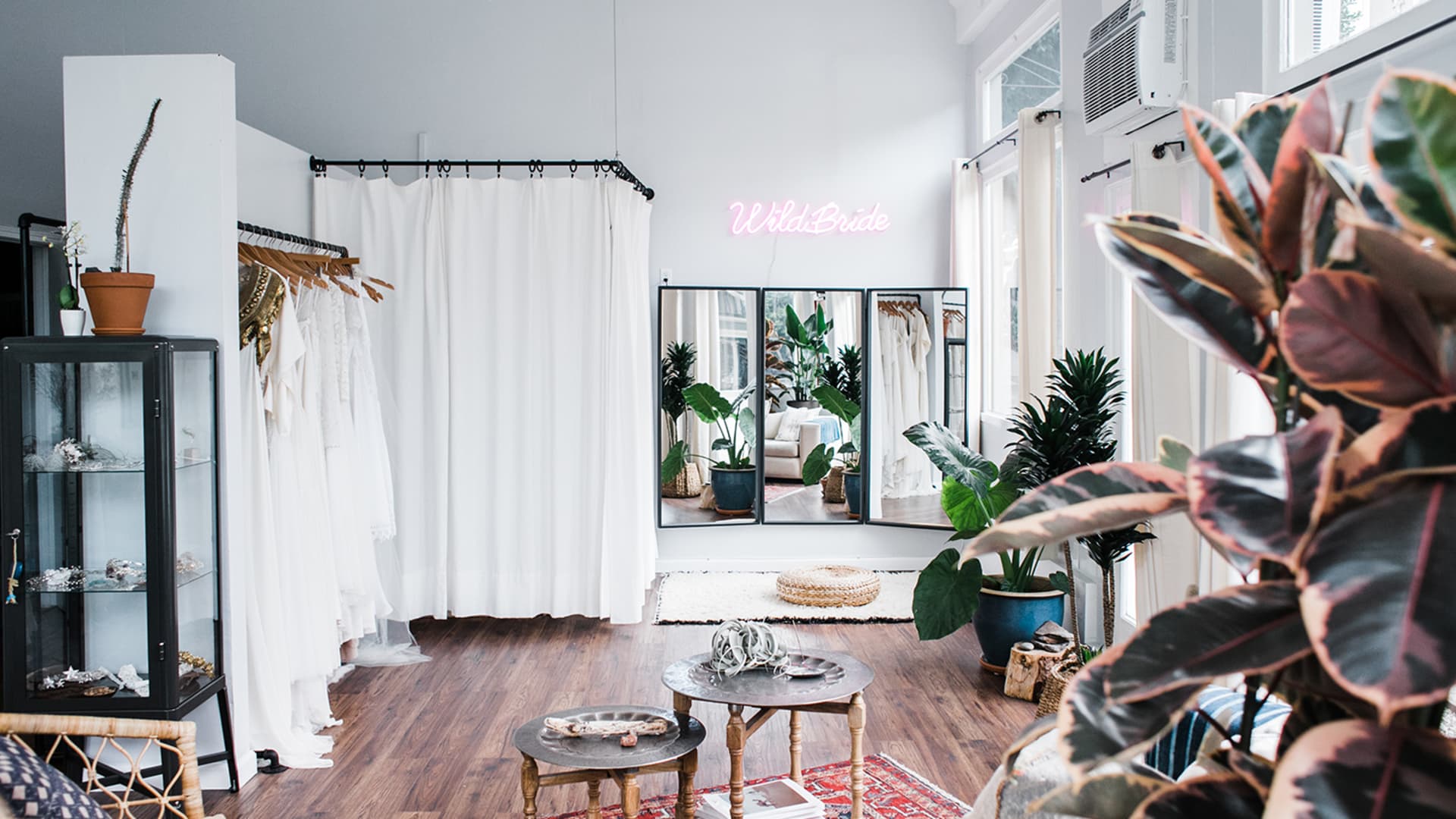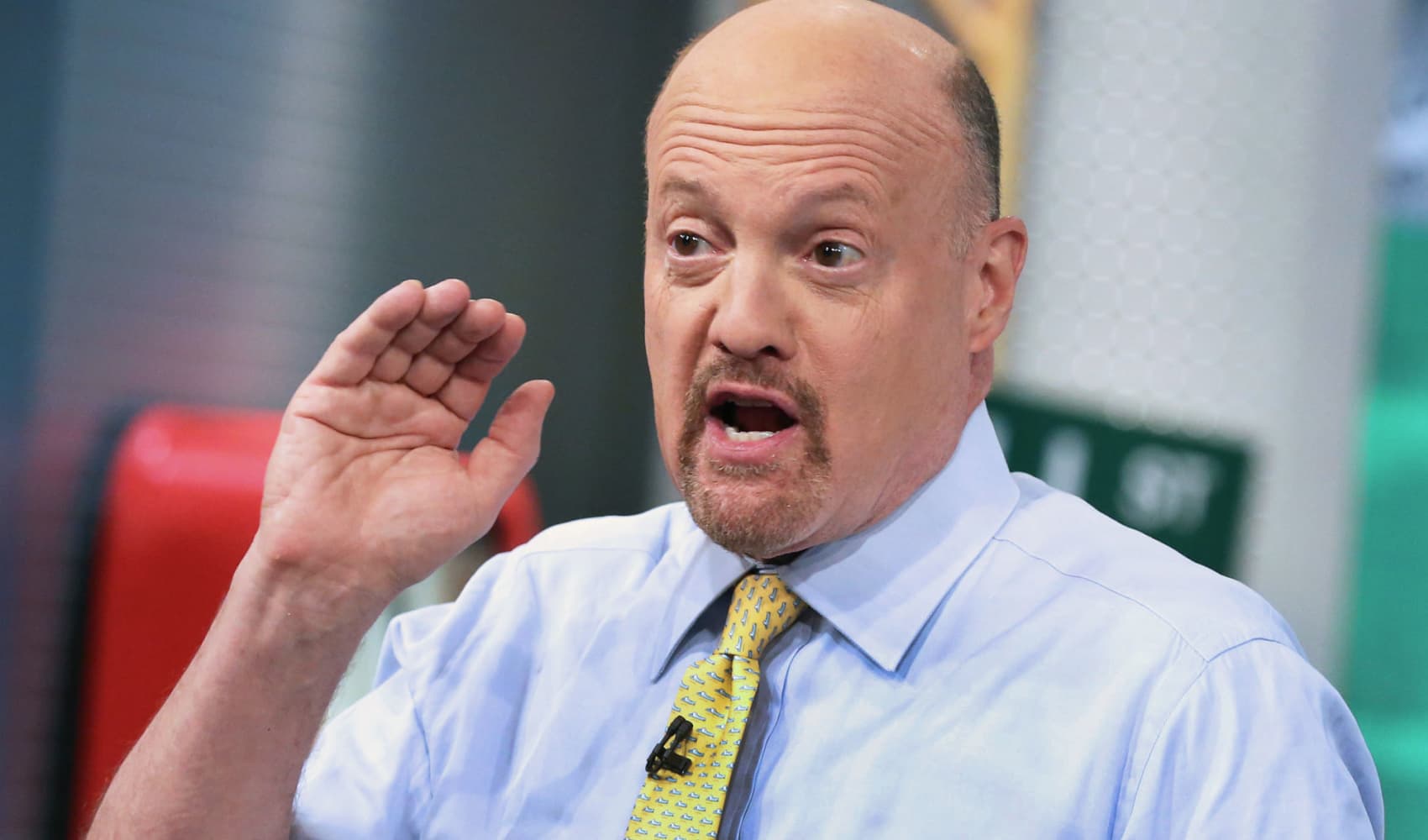
- Couples in the U.S. are expected to host roughly 2.5 million weddings this year, a 30% increase from the prior year and a number not seen in four decades, according to The Wedding Report.
- Prices are surging, too. The average couple spent $27,063 on their wedding in 2021, up from $20,286 in 2020.
- Couples are getting creative to save money, while wedding vendors continue to face supply chain headwinds leading to shortages.
Nicole Brandfon and her fiance, Adam Alonso, will hop on a plane from Florida to South America early next year for a destination wedding. The international trip wasn't their original plan, but it's saving them money.
The couple, engaged since last June, had been dreaming of holding their wedding in Miami, where they both work and reside. But as they started to plan, the duo quickly realized prices were out of reach and venue availability was slim to none for their intended time frame, either in late 2022 or early 2023.
"We spent three or four months looking at a lot of different venues and realized that we weren't going to be able to afford Miami," said Brandfon, a 29-year-old account director at a public relations agency.
Get Tri-state area news and weather forecasts to your inbox. Sign up for NBC New York newsletters.
Brandfon and Alonso's decision to marry abroad is just one example of how couples are getting creative to contend with the rising costs of putting on a wedding. Vendors are overbooked with pent-up demand created by the Covid pandemic. They're also facing supply chain headwinds leading to shortages. At the same time, inflation is driving up the cost of everything from food to labor.
Read more: Surging prices force consumers to ask: Can I live without it?
As a result, many couples are making trade-offs and rethinking priorities — opting for the dream wedding gown or the open bar over the extravagant floral arrangements.
Money Report
Brandfon and Alonso will say "I do" in February in the Caribbean coastal town of Cartagena, Colombia, at a fraction of the cost they were quoted closer to home. Now they're able to have a wedding planner, and they intend to serve a variety of foods at a fully seated dinner, according to Brandfon.
"Florida, or anywhere in the U.S., really," she said, "if we wanted anything extra it seemed like it was going to be another couple thousand dollars."
Cutting line items
Nearly 7 million couples in the U.S. are expected to tie the knot in the next three years, according to industry research firm The Wedding Report. The pandemic delayed weddings for many of them and accelerated relationship timelines for others, spurring engagements between partners who spent more time together — and enjoyed the extra company — when lockdowns persisted.
This year, couples are expected to host roughly 2.5 million weddings, a 30% increase from the prior year and a number not seen in four decades, according to The Wedding Report. In the next two years, the number is expected to taper off slightly, the national trade group says, but not by much. Americans are projected to plan 2.24 million weddings next year, and 2.17 million the year after.
The amount that couples are spending to tie the knot keeps creeping up, too. In 2021, the average couple spent $27,063 on their wedding, according to The Wedding Report, up from about $24,700 per couple in 2019. In 2020, around the onset of the pandemic, many couples opted for smaller ceremonies with fewer frills and spent an average of $20,286.
As celebrations roar back, couples are finding line items they can cut.
More couples are choosing to host weekday weddings, said Kim Forrest, a senior editor at WeddingWire. That helps with limited venue availability, but it comes with a cost advantage, too: Some venues offer discounts for events to be held on less-frequented days in the middle of the week.
The Biltmore Estate in Asheville, North Carolina, for example, charges a $10,000 facility fee for the property's Deerpark venue for a Saturday wedding this fall. For a Friday or Sunday, the fee will run you $8,000.
Forrest also noted that weddings held in the South tend to be less expensive than those in the Northeast, with cities like Boston and New York driving up the national average.
Prices on key wedding expenses are projected to be "much higher" this year than in recent years, in large part due to heightened food, labor and transportation costs, said Shane McMurray, founder of The Wedding Report. Plus, vendors that are seeing demand for bookings spike now have the ability to name their price, he said.
"These are the things that people care about the most — the food and the bar, the photography services, and of course the venue," he said. "Guest counts are also up, and that's going to cost more money."
That means couples could make sacrifices elsewhere along the planning process, he said, which would be a loss for some vendors. Couples might deprioritize paying for a wedding planner, for example, so long as they don't mind doing the extra work themselves.
Couples spend less money, on average, on beauty and spa services, a ceremony officiant and party favors for their wedding guests, according to data from The Wedding Report. There's more flexibility with these items to find less-costly options that will still get the job done, McMurray said. Add-ons like a photo booth or a videographer are commonly nixed altogether to stay within budget.
'We're going to have to take our prices up'
Vendors feeling the squeeze are trying to be more accommodating, knowing that many couples feel crunched for time and cash.
The 2022 wedding season is in "full bloom" on the heels of a pandemic-driven downturn, said Samira Araghi, founder and owner of San Francisco bridal boutique WildBride.
That means bigger business for WildBride, which offers a selection of bohemian-inspired wedding gowns, from brands such as Pronovias and Willowby, through its website and at its one brick-and-mortar shop on Fillmore Street.
There were moments during the pandemic where it felt as if society was opening back up again and couples were free to hold larger gatherings, she said. But it's been a bumpy recovery thanks to new virus variants causing periodic spikes.
"When the delta [variant] came, things got canceled again. And then when omicron came, things got canceled again," she said. "Right now we're definitely seeing a shift back to normal-sized weddings."
The most pressing issue that WildBride faces today is getting finished products through the mail, Araghi said, noting that many suppliers have shut down and that several fabrics, dresses and styles have been discontinued. "Supply chain issues are a big deal right now," she said.

In search of solutions, WildBride started to offer an "off-the-rack" selection during the pandemic. The dresses in the collection are either older styles or ones that could easily be bought in large batches from designers. Some of the dresses are discounted, depending on the condition.
It's become an appealing option for women planning a last-minute walk down the aisle or encountering logistical challenges while trying to secure another dress before the big day, Araghi said. It's also an option for the more price-sensitive customer, so they don't leave to shop elsewhere.
Araghi said she hasn't yet been forced to raise prices on items amid widespread inflation, although she's aware that it's happening at other vendors such as florists and jewelry shops.
As shipping costs keep rising, though, she said it's inevitable that the business will have to make adjustments — potentially before the end of the year.
"I do think it's going to happen that, yes, we're going to have to take our prices up," she said.
Post-boom downswing?
David's Bridal Chief Executive Officer James Marcum doesn't see the wedding boom nor consumers' sensitivity to higher prices dissipating anytime soon. That's why the company has been investing in its digital loyalty program and a vertically integrated supply chain, to be able to offer more perks and manufacture more dresses, he explained in a recent sit-down interview.
Marcum said he has started to notice some brides showing a hesitancy to splurge thousands of dollars for a dress. The retailer has a fairly expansive selection, with prices ranging from $70 to $2,000.
"You're starting to hear rumblings about the budget sensitivity," he said.
Of course, that doesn't mean the bride will forgo a dress altogether. She just might opt for a less-expensive option, Marcum said. "You're still going to see a robust, brighter [wedding dress] business, but it's really spreading over 2022 and 2023," he said.
Brides spent, on average, $1,499 on a wedding dress in 2021, according to The Wedding Report. That figure is expected to reach $1,527 this year, the report said.
By 2024, The Wedding Report projects the number of nuptials held in the U.S. will fall closer to 2018 levels, at 2.14 million. Couples can rest assured that some venues might be easier to come by, by then. But it's unclear where prices will stand.

Victoria Cela, a 27-year-old account executive at a public affairs firm in Florida, is betting on a downswing.
Cela and her fiance, Ricardo Goudie, became engaged in March. Instead of rushing to the altar, the couple is planning a wedding for early 2024 in order to give themselves enough time to save up money to cover the expenses, Cela said.
"Our parents will be helping us, but we obviously want to pitch in as much as we can," she said. "It's a luxury because we have more time."
They plan to host their ceremony at a family member's home in Coral Gables, just outside Miami, a choice that will allow them to put their money toward other things aside from the venue.
Cela hopes vendors' prices won't be so lofty by then.
"Every time I go on a website and gauge their prices, I'm like, 'OK maybe we need to up the budget a little bit more,'" she said.






